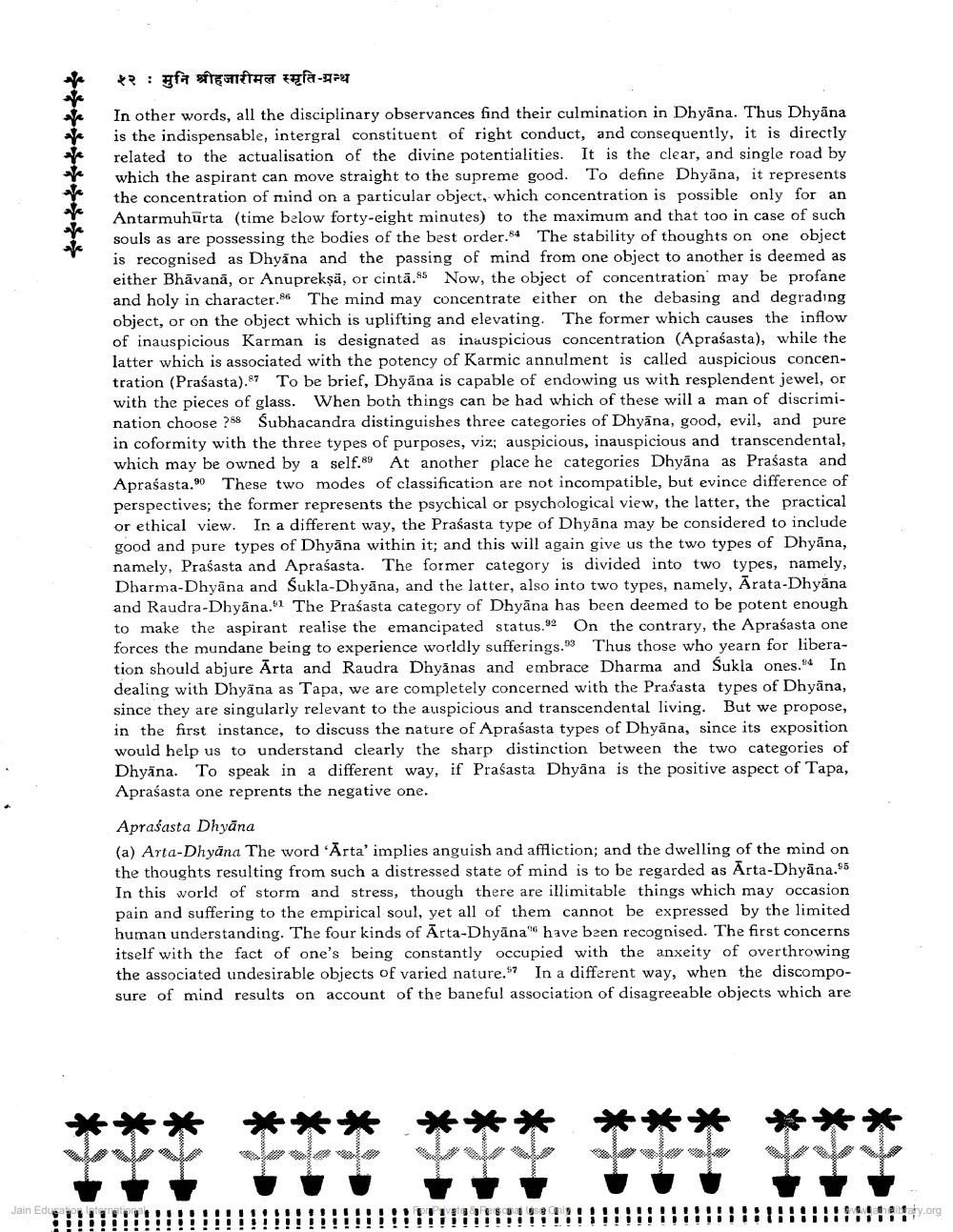Book Title: Concepts on Parisaha and Tapa in Jainism Author(s): Kamalchand Sogani Publisher: Z_Hajarimalmuni_Smruti_Granth_012040.pdf View full book textPage 8
________________ १२ : मुनि श्रीहजारीमल स्मृति-ग्रन्थ In other words, all the disciplinary observances find their culmination in Dhyana. Thus Dhyāna is the indispensable, intergral constituent of right conduct, and consequently, it is directly related to the actualisation of the divine potentialities. It is the clear, and single road by which the aspirant can move straight to the supreme good. To define Dhyana, it represents the concentration of mind on a particular object, which concentration is possible only for an Antarmuhurta (time below forty-eight minutes) to the maximum and that too in case of such souls as are possessing the bodies of the best order.84 The stability of thoughts on one object is recognised as Dhyana and the passing of mind from one object to another is deemed as either Bhāvanā, or Anupreksä, or cintā.85 Now, the object of concentration may be profane and holy in character.86 The mind may concentrate either on the debasing and degrading object, or on the object which is uplifting and elevating. The former which causes the inflow of inauspicious Karman is designated as inauspicious concentration (Apraśasta), while the latter which is associated with the potency of Karmic annulment is called auspicious concentration (Prasasta).87 To be brief, Dhyāna is capable of endowing us with resplendent jewel, or with the pieces of glass. When both things can be had which of these will a man of discrimination choose ?88 Subhacandra distinguishes three categories of Dhyāna, good, evil, and pure in coformity with the three types of purposes, viz; auspicious, inauspicious and transcendental, which may be owned by a self.89 At another place he categories Dhyana as Praśasta and Apraśasta." These two modes of classification are not incompatible, but evince difference of perspectives; the former represents the psychical or psychological view, the latter, the practical or ethical view. In a different way, the Praśasta type of Dhyāna may be considered to include good and pure types of Dhyana within it; and this will again give us the two types of Dhyāna, namely, Praśasta and Apraśasta. The former category is divided into two types, namely, Dharma-Dhyana and Sukla-Dhyāna, and the latter, also into two types, namely, Ārata-Dhyāna and Raudra-Dhyana." The Prasasta category of Dhyāna has been deemed to be potent enough to make the aspirant realise the emancipated status.92 On the contrary, the Aprašasta one forces the mundane being to experience worldly sufferings.93 Thus those who yearn for liberation should abjure Arta and Raudra Dhyānas and embrace Dharma and Sukla ones."* In dealing with Dhyana as Tapa, we are completely concerned with the Prasasta types of Dhyāna, since they are singularly relevant to the auspicious and transcendental living. But we propose, in the first instance, to discuss the nature of Apraśasta types of Dhyana, since its exposition would help us to understand clearly the sharp distinction between the two categories of Dhyana. To speak in a different way, if Praśasta Dhyāna is the positive aspect of Tapa, Aprašasta one reprents the negative one. Apraśasta Dhyāna (a) Arta-Dhyāna The word "Ārta' implies anguish and affliction; and the dwelling of the mind on the thoughts resulting from such a distressed state of mind is to be regarded as Ārta-Dhyāna.95 In this world of storm and stress, though there are illimitable things which may occasion pain and suffering to the empirical soul, yet all of them cannot be expressed by the limited human understanding. The four kinds of Ārta-Dhyāna" have been recognised. The first concerns itself with the fact of one's being constantly occupied with the anxeity of overthrowing the associated undesirable objects of varied nature. In a different way, when the discomposure of mind results on account of the baneful association of disagreeable objects which are * ** *** ** * *** ** * Jain Edu III. !! IIIIIIIIIIIIIIIIIIIIIDIIVSUI !!!!!!!!!!!!!!!!!!!!!!!!!!!!!! I IIIIIIIIIIIIIIIIIIIIIOGEO atay.org !IiiiiiiiiiiiiiiiiiiiiiiiiiiiiiPage Navigation
1 ... 6 7 8 9 10 11 12 13 14 15 16 17 18
